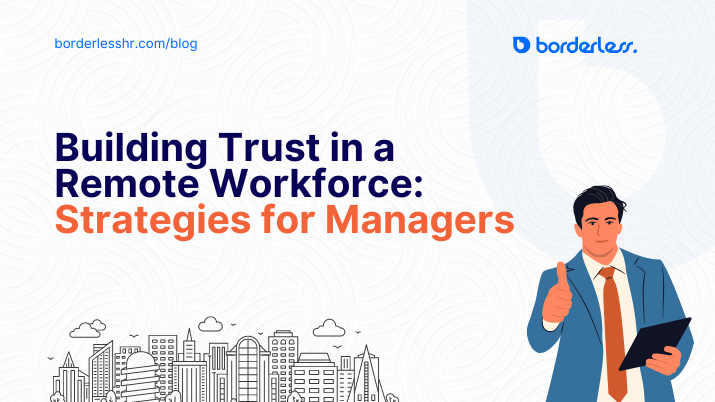As the world shifts towards remote work, remote work is becoming more prevalent than ever before. While it offers a number of benefits, one of the biggest challenges of managing a remote workforce is building trust between managers and employees who may never meet in person, and building trust in a remote workforce is crucial for managers. Building trust and communication with a remote workforce are also essential remote workforce strategies for developing an effective team. Through the proper use of technology, clear guidelines and expectations, and frequent check-ins, it is possible to build a thriving remote workforce that meets its goals. In this article, we will discuss strategies that managers can implement to build trust within their remote teams.
We will also explore strategies for managers to build trust in a remote workforce. By implementing these tactics, you can create a cohesive team that feels supported, valued, and productive, no matter where they are located.
Establish clear expectations and goals
One of the most important aspects of building trust is ensuring that everyone is on the same page. Clearly defining expectations and goals at the outset of any project is crucial. Make sure everyone understands their roles and responsibilities, as well as the timeline and expected outcomes. This helps to avoid misunderstandings and ensures everyone is working towards the same objectives. It is important to have a clear set of guidelines and expectations for team members when working remotely. This includes setting deadlines, choosing the right communication tools, setting clear roles, using specific processes, and providing feedback on performance.
Having these in place from the beginning helps ensure that team members are familiar with the requirements needed to do their job, which makes them more likely to become successful in their roles. It also helps to ensure that the team is working together in a cohesive manner, which can help to increase productivity and efficiency. Having these policies in place from the start can help to create a culture of accountability and respect within the team for your remote workforce strategies.
Provide Adequate Training and Resources
Providing adequate training and resources is essential for any team member—but particularly for those in remote roles. When people feel prepared to do their work, they can more successfully complete tasks and ultimately contribute to the success of the team. Provide all needed resources upfront to eliminate frustrations about tools or platforms that are difficult to use. Additionally, equip team members with the skills needed to navigate any challenges they may face while working remotely so they can find solutions independently. Offering opportunities for professional development is another effective way to build trust with remote employees. By investing in your team’s growth and development, you demonstrate that you value their contributions and are committed to helping them succeed. This can include providing access to training and resources, offering mentorship programs, or providing opportunities for advancement.
Make Time for Regular Check-Ins
Remote workers crave a sense of community and inclusion, which is why it’s important to make an effort to check in with them on a regular basis. Hold weekly meetings—ideally over video chats—where team members can catch up on their goals from the previous week and set intentions for the next week. This gives your remote staff the opportunity to connect on a deeper level and to build trust through meaningful conversations, which will give way for better collaboration. It also allows them to get to know each other better, which can help build a stronger team dynamic.
Additionally, it can provide an outlet for remote staff to share their ideas and opinions in a safe space, which can lead to more creative solutions and better problem-solving. Communication is key to building trust in a remote workforce. Regular check-ins with your team can help keep everyone informed, address any concerns, and keep the lines of communication open. Consider using a variety of communication tools to keep in touch, such as email, instant messaging, and video conferencing. This will help to create a sense of community and keep everyone feeling connected.
Offer Opportunities for Team Building
One key to building trust between remote workers is to create opportunities for them to socialize and get to know each other. This could include virtual team building activities, online social events, or even just regular check-ins to catch up and chat. Additionally, it is important to ensure that remote workers have the same access to resources and information as their in-office counterparts. It is essential to provide clear communication on expectations and goals so that everyone is on the same page.
Consider offering virtual activities such as happy hours, book clubs, crossword puzzles, trivia nights or scavenger hunts via video chats. These activities allow team members to connect on a personal level, fostering the relationships that will ultimately lead to better collaboration and a stronger trust among your remote workforce. Offering opportunities for professional development is another effective way to build trust with remote employees. By investing in your team’s growth and development, you demonstrate that you value their contributions and are committed to helping them succeed. This can include providing access to training and resources, offering mentorship programs, or providing opportunities for advancement.
Recognize Cultural Differences
It is also important to recognize and celebrate potential cultural differences among remote team members. For example, if a team is made up of members from different countries, it is important to recognize and celebrate the different cultural backgrounds and experiences that each member brings to the table. This can be done through activities such as virtual team-building exercises or by recognizing holidays and special occasions from each culture.
Additionally, remote teams should strive to create an inclusive environment where all members feel comfortable expressing their opinions and ideas to create a good workplace for your remote workforce strategies. Assure all team members that their perspectives are valued, not judged or dismissed. Make an effort to include cultural components in the way your remote team interacts. For example, increase international understanding of local customs and traditions such as holidays or cuisine and enrich your video calls by including language lessons for remote workers from different backgrounds.
Conclusion
In today’s fast-paced world, remote work is becoming the new normal, and it’s crucial for managers to build trust with their remote teams. By implementing the strategies we’ve discussed, you can create a cohesive team that’s committed to success. However, managing a remote workforce can be a challenge, and that’s where BorderlessHR can help. Our innovative HR solutions are designed to help you build a productive and engaged remote team. With our expertise, you can focus on building trust while we take care of administrative tasks. Contact us today to learn more about how BorderlessHR can help you manage your remote team and achieve success.







